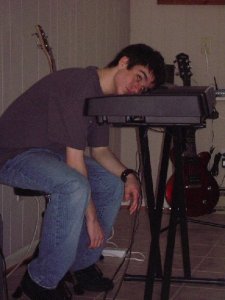Between belief and disbelief, certainty and uncertainty, trust and distrust lies doubt. Doubt can be deliberate questioning or a state of indecision, resulting in a reassessment of what reality means or a paralyzing suspension between contradictory propositions. An uncomfortable condition, as Voltaire observed, but preferable to certainty, which is inherently absurd. Or some surprising gap stretching intellect and emotion, resulting in delight. Join us in this intriguing gray area as we prepare our Winter 2013 Doubt issue.

Dylan Bargteil as tortured artist at age 16. Relegated to keyboard, he despairs that his songwriting and guitar playing will never be properly appreciated.
When I was a kid, my parents divorced. I would stay with my dad on the weekends, which quickly became filled with new traditions and routines that kept us close. Every Friday we would drive to Hollywood Video and walk the aisles to find a movie to watch together that night. As I approached my adolescent years, more often than not those movies came from the classics section of the store. Films such as To Kill a Mockingbird, The Great Escape and On the Waterfront were typical Friday night fare, and I became enamored with the ideals that many of the leading men in the films seemed to embody. The dogged determination and charm of Paul Newman, the immovable righteousness of Gregory Peck, the earnestness of Jimmy Stewart.
As I grew into adolescence, I styled myself as the cynic, the sarcastic wit, the emotional rock to which others could moor. Each couple of years brought a new attitude to chase and a new set of symbolic idols to worship. My idols were derived from real people but did not come close to accurately reflecting the complexities of the characters portrayed in their work let alone the frailties of the people behind those characters. I succumbed to this behavior in my creative pursuits as well. I was ensnared by the idea of the true artist as a suffering, isolated individual. I felt certain that art was a conduit for a pureness of expression not possible in the complicated reality of the world.
By the time I reached college, it was becoming clear that these attitudes were not serving me well. Driven by the singular nature of these idols, I was forming warped notions of myself and others. I started developing uncomfortable prejudices about the emotional and artistic capacities of others. Of course, I viewed myself as a unique case: I alone was a manifestation of my ideals, just as my idols were of theirs. I started to feel ugly and confused and then became depressed. I started to doubt my once vaunted idols and ideals.
As a result, I became more focused on the concrete stuff of reality, on the actions and utterances of myself and others. I admitted that I could not infer my own nature or the nature of others from such small chances for insight. We are much more complex machinery. I read Alan Watts’ The Way of Zen. You can be nothing but your nature, okay. I read William James’ Pragmatism. Truth is mutable, constructed and expedient, okay. I stopped having long arguments with myself about my suffering, my isolation and my judgments of the rest of the world. I got down to the business of simply doing and being.
My work improved dramatically. I stopped writing about paper-thin characters in nightmarish paintings or feelings in a void (not even attached to a character!). Instead, I wrote about making breakfast. It turns out that breakfast is a wonderful literary subject.
The growth that I experienced at college was the acceptance of doubt and uncertainty, which has proved critical not only in my personal but also my creative and academic life. As a poet and musician, doubt and self-doubt remain themes, couched in real narratives: being a drag on my friends at bars and parties, being incompetent at lighting a charcoal grill and the like. Whether factual or imagined, these are the elements that truly move me to check my expectations of myself and now form the crux of my creative experience.
Online Editor’s Note:
Dylan’s poem “A Brown Spot” was published in the our Winter 2012 Social Justice issue. You can read what went into its making in “Concerning Craft: Dylan Bargteil.”
The ideal and the doubt that it engenders also intrigued LPR Editor Laura Shovan. To learn more, read “In the Face of Doubt and Uncertainty: LPR Cover Art Selection.”

Clarinda Harriss
Terrific essay–so many ways for a reader/writer to feel intense empathy!
LikeLike
Dylan Bargteil
Thank you, Clarinda. As I’ve had more mature conversations about these experiences as I age, I’ve definitely felt much empathy for others’ similar stories. The panoply of ways people go through these transformations is inspiring.
LikeLike
Laura Shovan
Excellent piece, Dylan. It’s important for artists to confront that Byronic/Dark Romantic vision of the tortured artist, a stereotype which still exists. In fact, it was in this last week’s news: http://psychcentral.com/news/2012/10/17/writers-may-be-more-likely-to-have-schizophrenia/46157.html
LikeLike
Dylan Bargteil
Thank you, Laura. I agree that the stereotype is alive and well, but fortunately I have seen a lot of progress away from that image, even in popular culture and media commentary on art.
LikeLike
Tabatha
Enjoyed this essay! “It turns out that breakfast is a wonderful literary subject” made me smile.
LikeLike
Pingback: Delving into Doubt: The Doubtful Virtue of Religious Certainty | Little Patuxent Review
Pingback: Some Consequences of Submitting | Little Patuxent Review